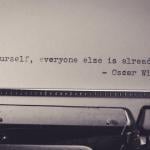
I feel it now: there’s a power in me to grasp and give shape to my world.
The line above is from the first poem in Rainier Maria Rilke’s Book of Hours (Barrows and Macy translation). Coming upon the line, contemplating it over a cup of coffee in the early hours, it occurred to me that the feeling described is perhaps the essential experience of spirituality.
That we can “grasp and give shape” our world is a common understanding of what we are as humans. This “power” has often been called our “free will.” Those who will use this power in many ways: to be leaders, scholars, artists of one form or another, to become rich, or to benefit others – such are ways we can grasp and shape our world.
Rilke’s line suggests these possibilities, but also suggests something quite different. It does not say “I have” the power to grasp and shape my world, it quite intentionally uses the passive voice. The power is in me, but the suggestion is that it is also more than me.
In the traditional, secular Western point of view, all the powers of the self belong to the self. The self is an agent that has a will. The self grasps and shapes its world. The active voice is encouraged. There is no sense of an otherness, a power beyond our little self, that is responsible for our ability to understand and shape our world.
The naturalistic perspective raises deep questions about this traditional view. Naturalistic psychology and particularly neurology find no evidence of this agent, this self, existing in the brain. In their view, what exists instead is a very complex network of neurons and an equally complex exchanges among the synapses of these countless neurons. Taken together, this somehow produces what we experience as awareness and thought. The sense of a self, from this perspective, is an effect whose cause is elsewhere – that elsewhere is the brain and what is often called the subconscious. But carrying these ideas back to the quote from Rilke, we can use it to provide a naturalistic interpretation of this “power in me.” It is a power of the brain, and the brain’s knowledge gained from the five senses open to the whole world.
This is not the way most spiritual or religious traditions view the matter. While there is considerable difference between various traditions about this, they all posit this “power” as either supernatural or highly metaphysical, such as a god, buddha nature, or Tao. But the point I want to make here is that it is possible to experience and understand this “power” in a way that is both naturalistic and spiritual. The naturalistic fact about self becomes a spiritual truth when we experience it, not as an idea but as the experiential truth of our very being. Such an experience can profoundly transform how we view our self, the world and the relation of our self to the world. And in this case, the relation is that we are part and parcel of the world, not something separate from it. We are an experiencing and knowing part of the world – to genuinely experience our self this way is rather mystical, whatever that word means.
But having brought the idea contained in Rilke’s quote to its mystical edge, let me bring it back to earth. We may be an effect whose cause is elsewhere, yet that effect, working through the body, can become a cause in the world. My ideas may arise from a neural network, but those ideas can bring changes. For instance, I can write an article such as this, and perhaps change other people’s thinking. So, even if we are only the effect of a neural network, yet we can “grasp and give shape” to our world. Further, these effects can reverberate back and become part of the web of causality that give rise to the future effect that is “me.” In this way, through conscious activity, we can transform our very self.
In an earlier article I had written that spirituality can bring light to darkness and form to formlessness. This is the tangible and practical side of spirituality. Our groping toward the hidden source of this power is the more mystical, esoteric side. Rilke’s quote is a wonderfully concise expression of both sides.
Now I doubt this quite what Rilke was thinking as he composed this poem. Yet, I don’t think what I’ve written here would be completely foreign to him either. His views on God, spirituality, and nature were quite subtle. In another poem in The Book of Hours he writes:
And no churches where God
is imprisoned and lamented
like a trapped and wounded animal…No yearning for an afterlife, no looking beyond,
no belittling of death,
but only looking for what belongs to us
and serving earth, lest we remain unused.
There is a sentiment most Spiritual Naturalist could agree with.
Subscribe to The Spiritual Naturalist Society
Learn about Membership in the Spiritual Naturalist SocietyThe Spiritual Naturalist Society works to spread awareness of spiritual naturalism as a way of life, develop its thought and practice, and help bring together like-minded practitioners in fellowship.
SNS strives to include diverse voices within the spectrum of naturalistic spirituality. Authors will vary in their opinions, terms, and outlook. The views of no single author therefore necessarily reflect those of all Spiritual Naturalists or of SNS.












